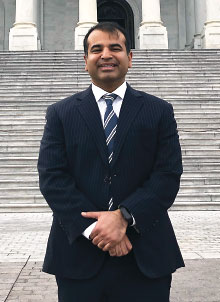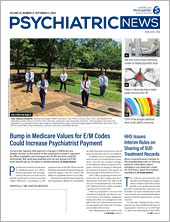Too often, students with mental illnesses are mislabeled at school as obstinate, misbehaving kids and receive punishment rather than the help they need. But an APA Foundation (APAF) program is working to change the conversation.
The APAF has revamped its program previously known as Typical or Troubled? (See
Psychiatric News), renaming it Notice. Talk. Act. at School. The new name emphasizes the skills that the program provides teachers and other school personnel in noticing warning signs of mental illness, talking about mental health with students, and taking steps to ensure that students are referred to appropriate resources.
“Schools are basically the child’s second home,” said Lisa Harding, M.D., a clinical instructor in the Department of Psychiatry at Yale School of Medicine. “If something is missed at home because parents are busy, for instance, this program gives teachers an extra tool in their toolbox to help kids get the services they need.”
According to data from Notice. Talk. Act. at School, 14 million students go to schools in which at least one police officer is present, but no counselor, nurse, psychologist, or social worker is on site.
The APAF is now working on getting the word out about its revamped program and is promoting it through such organizations as the School Social Worker Association of America, the Association for Middle Level Education, and the Learning First Alliance.
Notice. Talk. Act. at School teaches school staff how to have a conversation with students about mental health through both an electronic learning module and a live, skill-based training session. As many schools across the country plan to reopen virtually, Notice. Talk. Act. at School can also be delivered online, so it is ready to respond to schools’ needs, whether they provide virtual or in-person instruction to students, said Chris Seeley, the APAF’s program director of school and justice initiatives. The APAF has developed resources for schools that are holding virtual classes this fall to help school staff notice changes in their students’ behavior even while interacting with them at home.
“Notice. Talk. Act. at School is vitally important, and it’s needed now more than ever,” said APA CEO and Medical Director Saul Levin, M.D., M.P.A. “Children need support from the adults in their lives, yet school personnel don’t always know how to start conversations about mental health. This program gives teachers and other school staff the knowledge they need to help their students.”
Since it started in 2006, the program has trained more than 80,000 school personnel who work with more than a million students in more than 220 schools. Last year, the program launched in six school districts, and 86 APA members went through the certification training to participate in the program. The training prepares them to deliver the curriculum to middle and high schools across the country and work with the schools’ support services team to design and deliver the classroom portion. Instructors share their psychiatric expertise with school staff, showing them how to effectively communicate with students about mental health and how to start conversations.
Anish Dube, M.D., M.P.H., is a child and adolescent psychiatrist in the juvenile justice system in Orange County, Calif., and a member of APA’s Council on Children, Adolescents, and Their Families. He said the majority of mental health problems in the youth he treats are first noticed by someone in the young person’s life other than a psychiatrist or mental health professional. “The first point of contact is either going to be at home by parents or family, or it’s going to be at school, where the kids spend most of their time,” he said. “You’re empowering the folks who spend the most time with children with special mental health needs to take action right away.”
Notice. Talk. Act. at School also provides psychiatrists with a way to engage with members of their communities by reaching out to their local networks and sharing information about the program, Dube said.
Harding emphasized that the program does not encourage teachers or school staff to diagnose their students. Rather, it provides them with a heightened awareness of the signs of mental illness and helps them recognize when students need additional support.
She has been working with her local principal and school board to get the program going. Early career psychiatrists and psychiatry fellows have a role to play in expanding the program, said Harding, who first became involved in the predecessor of Notice. Talk. Act. at School when she was an APA Diversity Leadership Fellow and then an APA Foundation Ambassador.
“We already ask teachers to do so much without adequate training,” Harding said. “What this program is doing is empowering them to understand what their students are going through and make sure they get help.” ■
Resources and information about getting involved in the Notice. Talk. Act. at School program are posted
here.


